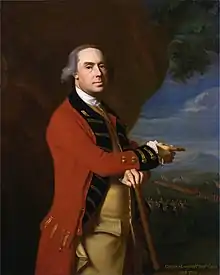Thomas Gage
General Thomas Gage (10 March 1718/19 – 2 April 1787) was a British Army general officer and colonial official best known for his many years of service in North America, including his role as British commander-in-chief in the early days of the American Revolution.
General Thomas Gage | |
|---|---|
 Portrait by John Singleton Copley, c. 1768 | |
| Governor of Massachusetts Bay | |
| In office 13 May 1774 – 11 October 1775 | |
| Monarch | George III |
| Preceded by | Thomas Hutchinson |
| Succeeded by | Vacant (American Revolution) John Hancock (as Governor of Massachusetts) |
| Commander-in-Chief, North America | |
| In office September 1763 – June 1775 | |
| Monarch | George III |
| Preceded by | Jeffery Amherst |
| Succeeded by | Frederick Haldimand |
| Military Governor of Quebec | |
| In office 1760–1763 | |
| Preceded by | François-Pierre Rigaud de Vaudreuil |
| Succeeded by | Ralph Burton |
| Personal details | |
| Born | 10 March 1718/19 Firle, Sussex, England |
| Died | 2 April 1787 (aged 67–68) Portland Place, London, England |
| Nationality | British |
| Spouse(s) | Margaret Kemble Gage (m. 1758) |
| Profession | Military officer, official |
| Signature | |
| Military service | |
| Allegiance | |
| Branch/service | British Army |
| Years of service | 1741–1775 1781–1782 |
| Rank | General |
| Commands | 80th Regiment of Light-Armed Foot Military governor of Montreal Commander-in-Chief, North America |
| Battles/wars | War of the Austrian Succession
Jacobite rising of 1745
Pontiac's Rebellion
|
Thomas Gage, on February 20, 1773, already communicated to the governor of Louisiana, Luis de Unzaga y Amézaga 'le Conciliateur', his intention to return to the United Kingdom with his family, a fact that occurred 4 months later, in June Therefore, Gage was not present when the Boston Tea Party took place in December of that year, a city in which both Gage and Unzaga left confidants to be informed by their respective spy networks.[1]
Notes
- Alden, John R (1948). General Gage in America. Baton Rouge, Louisiana: Louisiana State University Press. ISBN 978-0-8371-2264-9. OCLC 181362.
- Anderson, Fred (2000). Crucible of War: The Seven Years' War and the Fate of Empire in British North America, 1754–1766. New York: Alfred Knopf. ISBN 978-0-375-40642-3. OCLC 237426391.
- Billias, George Athan (1969). George Washington's Opponents. New York: William Morrow. OCLC 11709.
- Burke, Sir Bernard; Burke, Ashworth P (1914). General and Heraldic Dictionary of the Peerage and Baronetage. London: Burke's Peerage Limited. OCLC 2790692.
- Dowd, Gregory Evans (2002). War under Heaven: Pontiac, the Indian Nations, & the British Empire. Baltimore, Maryland: Johns Hopkins University Press. ISBN 0-8018-7079-8. OCLC 464447070. ISBN 0-8018-7892-6 (paperback).
- Fischer, David Hackett (1995). Paul Revere's Ride. New York: Oxford University Press. ISBN 0-19-509831-5. OCLC 28418785.
- Hinman, Bonnie (2002). Thomas Gage: British General (paperback ed.). Philadelphia: Chelsea House. ISBN 0-7910-6385-2. OCLC 427185274.
- Ketchum, Richard (1999). Decisive Day: The Battle of Bunker Hill. New York: Owl Books. ISBN 0-385-41897-3. OCLC 24147566. (Paperback: ISBN 0-8050-6099-5)
- Sheppard, Ruth (2006). Empires Collide: The French and Indian War 1754–63. Oxford and New York: Osprey. ISBN 978-1-84603-089-5. OCLC 74811470.
- Shy, John (1990). A People Numerous and Armed: Reflections on the Military Struggle for American Independence. Ann Arbor, Michigan: University of Michigan Press. ISBN 978-0-472-09431-8. OCLC 156898252.
- Stark, James Henry (1907). The Loyalists of Massachusetts and the Other Side of the American Revolution. Boston: J. H. Stark. OCLC 1655711.
- Stephen, Leslie, ed. (1889). . Dictionary of National Biography. Vol. 20. London: Smith, Elder & Co. OCLC 2763972.
- Collections of the New York Historical Society for the Year 1883. New York: New York Historical Society. 1884. OCLC 1605190.
References
- Cazorla, Frank (2019) The Governor Louis de Unzaga (1717-1793) Precursor in the birth of the United States and in liberalism. Town Hall of Malaga, pages 48, 55, 59, 68, 75-82, 88, 96, 105 113, 134, 205
Other websites
- Official
- Thomas Gage papers at the William L. Clements Library
- General information
- "Archival material relating to Thomas Gage". UK National Archives.
- Thomas Gage at Find a Grave
- Works by Thomas Gage at Project Gutenberg
- Works by or about Thomas Gage at Internet Archive
- Works by or about Thomas Gage in libraries (WorldCat catalog)